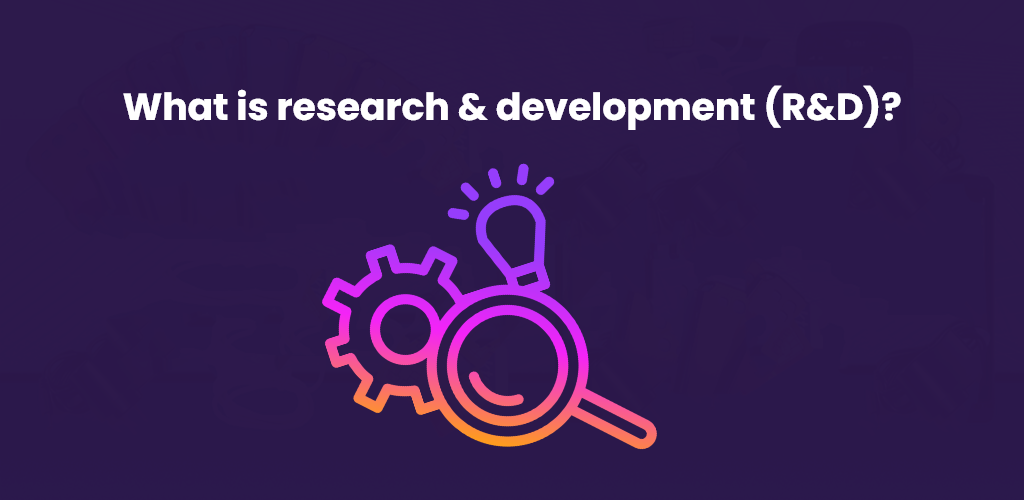What is research & development (R&D)?
All the technology we take for granted today as part of our businesses was once thought of as impossible, or at the very least, unlikely. But the technology didn’t just emerge from nowhere – and unfortunately, innovation comes at a cost, even if the initial idea doesn’t cost a penny.
Research and development is the process of looking into solutions to problems that haven’t been solved yet, or finding new and innovative solutions that have advantages over the methods that are currently in use. Alternatively, it may be a methodology or process that saves time and resources to produce a given outcome or material, or even produces a better quality or stronger one (that can also be licensed). This is usually a gateway to either creating and refining a technology that can be leveraged and licensed for profit, but research and development is sometimes done for purely charitable or philanthropic reasons.
Research and development might mean improving your processes internally, or it might mean developing a new product that your customers are looking for but nobody else provides. This obviously might also involve creating new methods and tooling that overlaps.
How do companies benefit from conducting research & development?
Research and development is something you do when you want to invest in improving the profits and performance of your company. This can be to produce a new product, or for existing products and services you may want to find new sources of supply for ethical or financial reasons, or to make your company a safer place for your workforce. You’ll be investing money and time based on an outcome you think will provide greater value in the long run, such as:
- Saving time on a process to allow you to produce more in a given time period and meet the needs of your customers
- Reducing waste will improve your profit margins and reduce associated bills for clean-up and disposal, especially if your process involves substances requiring specialised disposal
- Improving safety reduces stoppage, staff turnover and wasted materials as well as fines or other expenses
- Identifying alternative materials or supplies can save money, improve your ability to work through shortages from one supplier, or open options for better ethical policies and promotion to improve sales
- Finding ways to remove expensive materials or complex tools from the process may improve margins
- Minimising maintenance through improved tooling in order to reduce downtime and costs
These aren’t the only reasons to invest in research and development of course. Each business has unique and specific challenges that may be resolved by the investment and work done by the research and development project.
Why is research and development encouraged by governments?
Research and development is a valuable tool for bringing money into the economy of a modern country, and diplomatically brings a lot of what is thought of as ‘soft power’ – influence, goodwill, and innovation, which marks the country out as a leader in a field. Therefore governments tend to find ways to reward those who are successful in producing new products and processes by investing in research and development attracting, and that keep intelligent and productive people in the country.
In the UK, the government encourages and rewards companies that invest in research and development and novel processes through tax relief – offsetting the money you spend on research and development against your annual tax bill. They are quite specific about the terms of this relief, but it does mean that companies that can successfully invest in research and development that benefits them, and that offers commercial opportunities for licensing and profit. They will also be able to either to commit to previously marginal projects, or see their potential returns increase substantially. The government offsets these write offs by seeing increased sales and employment, among other things that generate revenue.
What qualifies as research & development in the UK?
In the UK, you can’t claim just ANYTHING as research and development – it has to be something relevant to your company and what you do, and it has to be a project with specified goals and outcomes. It can’t be anything that is deemed to be reinventing the wheel, or doing exactly what someone else already does with small changes – it has to be something completely new, or radically different to existing methods or products available.
It also has to be something that is an overall enhancement in some way to the field, not just specific to your business. So, you might find a process that specifically enhances your manufacturing and finishing process, but isn’t applicable because it is so specific to your product – that simply wouldn’t count. But finding a novel way to speed up a commonly used segment of the process, like complex metal parts being folded faster and more accurately by a substantial margin at the same or lower cost, might very well be.
The main thing that they ask is that you can define what you were trying to achieve, what specific unknowns you were trying to overcome, and how you did so (or didn’t) to quantify that you were achieving something to justify the government helping to pay for it. The important thing is make sure you think it through, plan properly with the appropriate business analyses, and don’t be afraid to talk to someone with experience when it comes time to apply!
What are the downsides to research & development?
The biggest worry with research and development is that you may not achieve your desired outcome. You may invest a large amount of money in a promising idea that doesn’t pan out, or ends up more expensive than the traditional method. Your alternative material may complicate manufacturing, produce lower quality products or even be more expensive than the traditional product, making it unviable. As such, an important part of research and development is to ensure that you regularly review the progress of the project against expectations. This may necessitate difficult decisions, but you may need to terminate poorly performing projects that don’t play out to benefit the company and avoid spending more money than is necessary or viable.
Research and development can be a valuable tool for your business – but it can also be a dangerous burden. Used well, it can be an investment to improve the performance of your business, create new revenue streams or even change the direction of your business. You might move from making products to creating tools and equipment others use to make those products, for example. Used badly, and without appropriate oversight and forethought, it can cripple companies and leave all your staff unemployed. As with anything that requires investment, make sure you are always aware of progress, and where the money is being spent, and ensure the business can sustain it.


DropShip products from verified suppliers to diversify your inventory and scale your eCommerce business